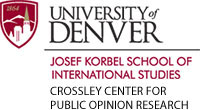More than 100 friends of the Crossley Center for Public Opinion Research joined Colorado political professionals on December 15 in a Zoom discussion of the dominance of the state by the Democratic Party, the decline of the Republican Party and what could reverse the trend.
Democrat Steve Welchert made the case for Colorado as “officially blue, not purple, not periwinkle, not power blue.” But Republican Dick Wadhams said trends cycle and Republicans would be back if they significantly upped their game.
Although 2020 felt like the wildest election year in most people’s lifetimes, 2022 will be significant for politics in Colorado with the reelection of Senator Michael Bennet, Governor Jared Polis and all the state constitutional offices, many benefitting from the state’s voters being adverse to Donald Trump, who won’t be in office or on the ballot.
Republicans have not held statewide federal positions since early in the century, with the exception of Cory Gardner’s election in 2014. The party has been without a governor since Bill Owens’ term-limited service ended in 2004 and other statewide constitutional offices; i.e., attorney general, secretary of state, treasurer, ended in the Democratic sweep of 2018.
A video of “Colorado Election: What’s next?” can be linked to at the end of this blog post.
This session ended the Election Central program for 2020, which tracked the national and state elections in a series of nine panels and presentations, beginning with an overview provided September 1 through the day after the November 3 election analysis and closing with final observations December 15. It included foreign policy panels on China and Japan, and programs on polling and forecasting, media coverage, and the best predictions by political experts.
The program was sponsored by the Crossley Center for Public Opinion Research; the Josef Korbel School of International Studies; on several sessions, the Consulate-General of Japan in Denver; and, of course, the University of Denver.
WATCH VIDEO











